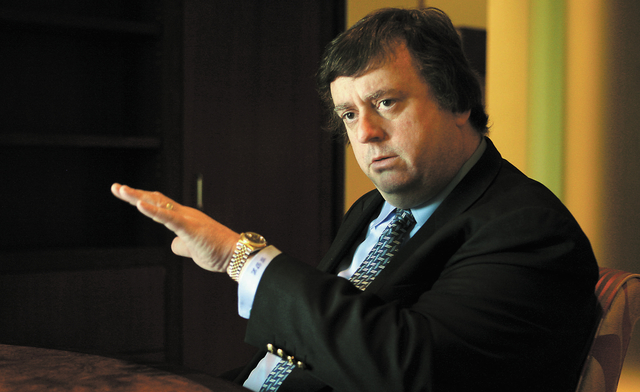Caesars Entertainment’s terrible, horrible, no good and very bad weekend
Has there ever been a gaming company that suffered through a worse 72-hour period than Caesars Entertainment Corp.?
On a Friday evening, Caesars was punted from a proposed $1 billion project in Boston. Then the company was forced to dump its licensing partner in a $185 million Strip casino renovation. Hours later, Caesars had to report in a filing with the Securities and Exchange Commission that the company is being targeted in a federal investigation for possible violations of the Bank Secrecy Act at Caesars Palace.
By Monday morning, Caesars Entertainment was in a full-scale public relations meltdown.
Around the time Caesars revealed the money-laundering probe, a senseless shooting in the company’s Bally’s Las Vegas left an innocent bystander dead and two security officers wounded.
What is the saying about bad news happens in threes? How about fours and fives?
When the body of a baby was discovered in a dumpster behind Planet Hollywood Resort late Monday afternoon, even the harshest critics of Caesars Chairman and CEO Gary Loveman were feeling sorry for the executive and the embattled company.
No one would have been surprised if locusts had swarmed the Rio.
Luckily for Loveman and Caesars, Las Vegas Sands Corp. Chairman Sheldon Adelson took away some of the attention when he told a New York City audience his idea for Diplomacy 101: Send Iran a message in the form of a nuclear missile.
For a day, Loveman and Caesars were off the radar.
But Caesars’ issues — both financial and perceived — are deep.
The trigger for the company’s weekend in hell was a nearly 600-page investigative report issued by the Massachusetts Gaming Commission. Regulators said Caesars — which operates 54 casinos in 13 states — wasn’t suitable to manage a casino there. The commission suggested that the Suffolk Downs Race Track cut loose its partner in the project.
Over the weekend, the company said the report focused on the New York-based Gansevoort Hotel Group, which was licensing its name to the boutique luxury hotel Caesars is creating out of Bill’s Gamblin’ Hall. A Gansevoort investor reportedly had ties to the Russian mafia.
That wasn’t the only issue investigators cited.
Questions were raised about Caesars’ industry-high $23.5 billion in long-term debt. Investigators stated that the interest payments alone consume virtually all of the company’s current cash flow.
“Caesars is currently meeting its debt covenant requirements,” the report stated in its executive summary. “However, should the economy fail to recover sufficiently or if another downturn occurs, it could become difficult for Caesars to meet its debt service and covenant requirements.”
Also, Massachusetts said a “significant issue” surrounded the company’s handling of high roller Terrance Watanabe, who lost more than $100 million at Caesars Palace and the Rio in 2006 and 2007. Watanabe refused to pay his markers, saying Caesars plied him with alcohol and encouraged him to gamble while intoxicated.
He sued Caesars in District Court in Clark County, but the matter was settled. Caesars revised its compliance program. New Jersey gaming regulators fined the company $225,000 for the matter, although none of the conduct took place at the company’s Atlantic City casinos.
“The episode touches on numerous concerns, including the lengths to which casino operators will go to cater to high rollers and problem gaming,” the report stated.
Investigators also focused on Caesars Interactive Gaming CEO Mitch Garber’s past employment with Europe-based Internet gaming companies that accepted wagers from Americans before passage of the 2006 Unlawful Internet Gambling Enforcement Act. Garber, who is also CEO of the newly formed subsidiary, Caesars Acquisition Co., was licensed in Nevada earlier this year.
The writing was on the wall and Caesars cut its losses.
Loveman, who lives in the Boston area, was critical of the regulators. He told The Boston Globe, “It’s going to be very difficult for sophisticated, multijurisdictional operators to tolerate the environment this commission has created.”
Caesars said it was prepared to “thoroughly address” each of the concerns raised by the report.
In a statement, the company said, “We withdrew our application at the request of and in deference to our partners in the project.”
Caesars may get a chance to address the report in other markets.
The Maryland Lottery and Gaming Control Agency said Tuesday it wants to learn more about the Massachusetts investigation and the money-laundering inquiry. Caesars is partner with Rock Gaming in developing the $400 million Horseshoe Casino Baltimore.
The Ohio Casino Control Commission also plans to review the report. Caesars operates Horseshoe casinos in Cincinnati and Cleveland and a Cleveland-area racetrack casino, all with Rock Gaming.
Meanwhile, Nevada regulators will review Massachusetts’ findings. Gaming Control Board Chairman A.G. Burnett confirmed last week that state agents are working with the U.S. Treasury Department’s Financial Crimes Enforcement Network, aka FinCen, on the Caesars Palace money-laundering matter.
If federal laws were violated, the state could bring disciplinary action against Caesars.
The noise surrounding Massachusetts and FinCen didn’t mute discussion of the company’s debt issues.
Caesars is restructuring $4 billion of the debt coming due this year, securing new debt with maturity dates starting at 2020. The loans are backed by some of the company’s newer Strip projects, including the 668-room Octavius Tower at Caesars Palace and the under-construction $550 million Linq project.
Massachusetts regulators expressed concern that Caesars would have to take drastic measures, such as selling properties and canceling projects, if cash flows can’t service the debt payments.
Caesars will report third-quarter results Tuesday. It’s doubtful property performance will the primary topic on analysts’ minds when the question-and-answer session with Loveman begins.
Howard Stutz’s Inside Gaming column appears Sundays. He can be reached at hstutz@reviewjournal.com or 702-477-3871. Follow @howardstutz on Twitter.

















